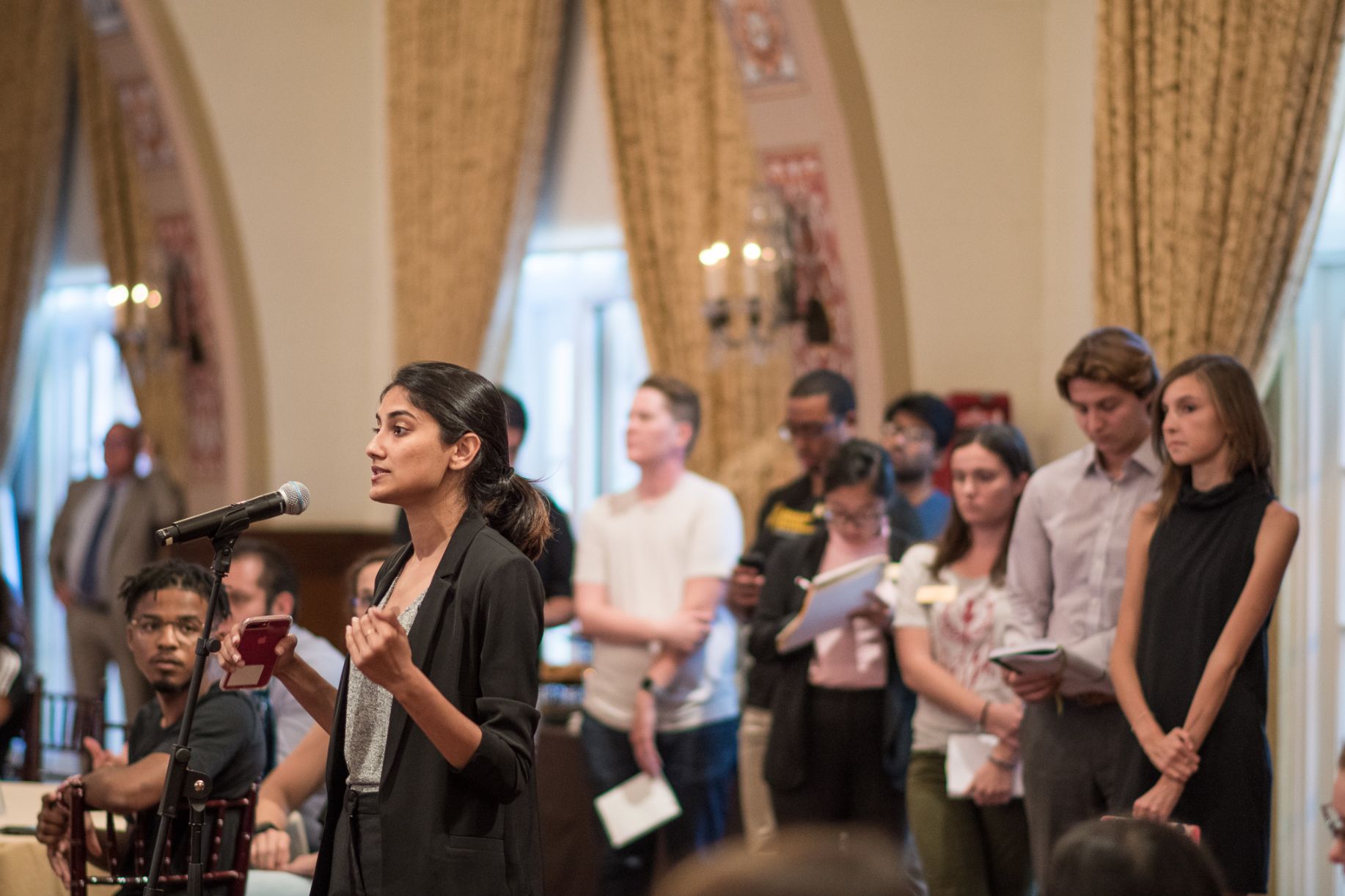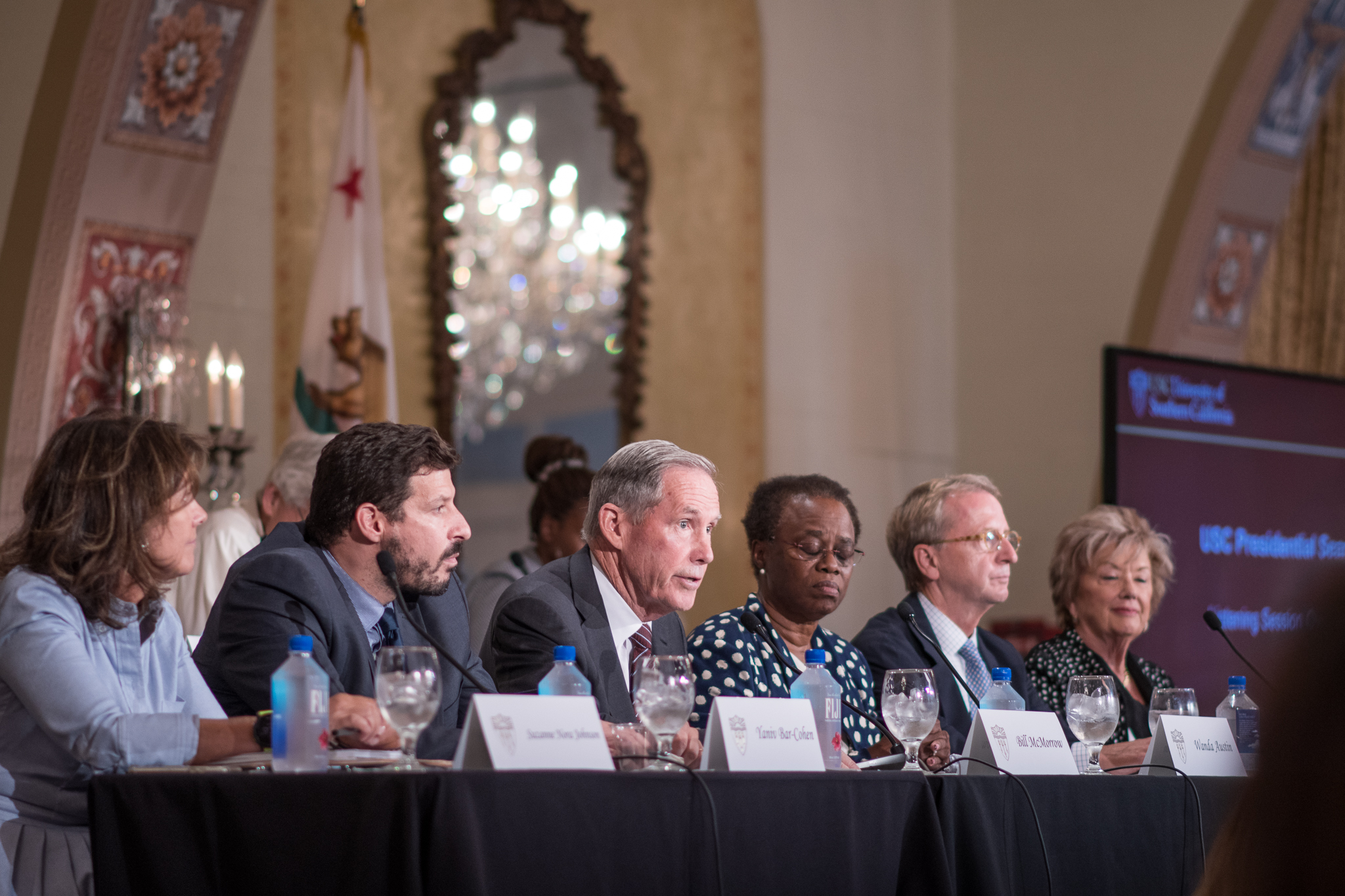Student leaders voice hopes for new president

Shradha Jain, president of USC Interfaith Council, emphasized the importance of finding a president who will interact with diversity groups on campus. (Emily Smith | Daily Trojan)
The opening comment of the first presidential search forum Wednesday embodied some students’ greatest concern: Students do not feel that their opinions are recognized by USC’s administration.
“It’s very clear that [Chairman Rick Caruso] said that adding students to this committee will complicate the process, as it has already begun,” said Rick Keaton, chief of staff of Undergraduate Student Government.
Keaton asked Trustee David Bohnett for his thoughts on the chairman’s comment.
“This is a point of order here,” interim president Wanda Austin interrupted. “This is not a question and answer session — this is a listening session.”
The appointed 23-person search committee for the next president consists of trustees and faculty. Twelve were present at Wednesday’s listening session at Town and Gown. The session was exclusive to 600 student leaders invited by Vice President of Student Affairs Ainsley Carry. It was moderated by Trustee William McMorrow.
“I think it was interesting that there wasn’t really a conversation … a back-and-forth, an opportunity for students to hear why … there isn’t a student representative on the committee,” said Mai Mizuno, a senior majoring in international relations and philosophy, politics and law, after the event.
The town hall-style listening session lasted for about an hour, with students voicing the qualities they hope to see in a new president, and what campus issues the administration should address. Comments were wide-ranging, from issues of mental health and diverse faculty retention to campus over-policing and sustainability goals.
Throughout, students echoed similar sentiments: They want a president with integrity and good moral character, who can be empathetic to the concerns of students, faculty, staff and the local L.A. community.
“The biggest quality I think a president needs is empathy,” said Helenes President Alexa Huerta. “We need someone who is empathetic to the surrounding community members … for those who have the potential to succeed, but may not have the resources to achieve the same level of success as others.”
Some student leaders also spoke about various scandals that hit USC, following their publication in the Los Angeles Times.
“Trust is earned, and so I hope that the next president will be someone who could earn our trust with tangible actions and measures that give us a reason to continue putting faith into the people who lead us,” said USG President Debbie Lee.
In addition to addressing desired qualities of a future president, students clamored for long-term solutions for campus problems, beyond appointing a new University leader.

Some members of the presidential search committee listened to students voice their opinions and concerns but did not take questions. Students said they wanted the committee to pay close attention to the issues brought up at the forum, after noticing some members not taking notes. (Emily Smith | Daily Trojan)
Students also shared personal experiences of poor mental health services and of losing close faculty advisors.
“In the four years that I’ve been here I’ve lost two advisors, both transgender faculty members because this university cannot retain trans, queer or women of color faculty,” said Emmett Harsin Drager, the Graduate Student Government vice president of advocacy.
Speakers representing all types of student groups expressed their hopes for improved diversity and inclusion, but a leadership quality they emphasized was respect.
“I want someone who won’t infantilize [students] … who will demand the same respect from all faculty, staff, administrators and trustees towards the students — the students that make this a university rather than a glorified, glamorized and corporate think tank,” said Kristopher Coombs Jr., the GSG vice president of programming. Coombs’ message was met with resounding applause from students.
These listening sessions are the first phase of the presidential search, as the committee seeks to understand challenges and gain input, McMorrow said. Following the sessions, the committee will search for and narrow the number of candidates before the Board of Trustees officially selects the new president. The search is expected to be completed in another three to six months, McMorrow said.
“At the core of it, I’m just extremely proud of what happened here tonight and I thought that the ideas everyone had and the feedback they gave us in many cases was spot-on,” McMorrow said. “The thing that I heard over and over again, as I said at the end, was that the students, which are our clients, they want to see this great quality of empathy and a moral high ground in our new leader.”
